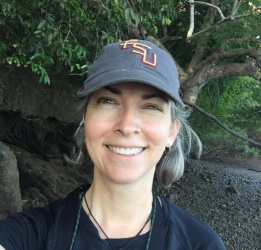Biological Science Faculty Member
Dr. Emily H. DuVal
- Office: 4078 King Life Sciences
- Office: (850) 644-2467
- Area: Ecology & Evolution
- Lab: King Life Sciences
- Lab: (850) 644-3915
- Fax: (850) 645-8447
- Mail code: 4295
- E-mail: ehduval@bio.fsu.edu

Professor
Ph.D., University of California, Berkeley, 2005
Graduate Faculty Status
Research and Professional Interests:
My primary area of interest is behavioral ecology. My research program explores the evolution of social behavior in animals, particularly birds, with an emphasis on cooperation, sexual selection, and reproductive strategies. I combine field studies of behavior, demography, and morphology with genetic analyses of the relationships between individuals to test hypotheses about the forces that create and maintain social complexity.
My current projects investigate (1) the adaptive basis of female mate choice in the absence of direct benefits (i.e. territory quality or paternal care); (2) the effects of complex mating strategies on temporal and spatial genetic variation at the population level; (3) the mechanisms of mate choice from both male and female perspectives; and (4) the balance between male competition and female mate choice in determining the opportunity for sexual selection to occur.My present research uses lance-tailed manakins (Chiroxiphia lanceolata) as a model system, but research in my lab is not limited by taxon. I am currently accepting applications from prospective graduate students.
Selected Publications:
Rivers, P.R.R., P. E. Bolton, C. N. Balakrishnan, E.H. DuVal (under review) Predictors of major histocompatibility complex copy number across the passerine bird radiation.
Dietz, S.A., DuVal, E.H., and Cox, J.A. (in revision) Natal habitat preference induction does not explain settlement decisions in Brown-headed Nuthatches.
Rivers, P.R. and E.H. DuVal. (2024) Chemical communication in the mating behavior of a highly polygynous bird. Behavioral Ecology and Sociobiology. 78: 69 https://doi.org/10.1007/s00265-024-03477-0
DuVal, E.H., C.L. Fitzpatrick, E.A.Hobson, M.R. Servedio. (2023) Inferred Attractiveness: a generalized mechanism for sexual selection that can maintain variation in traits and preferences over time. PLoS Biology 21(10): e3002269. https://doi.org/10.1371/journal.pbio.3002269; Associated commentary: Mendelson TC, Patricelli GL, Hebets EA (2023) Could sexual selection be driven by the mistaken inferences of young females? PLoS Biol 21(10): e3002321. https://doi.org/10.1371/journal.pbio.3002321
Norton, J.E.* and E.H. DuVal. (2023) Causes and consequences of nest-site fidelity in a tropical lekking bird: Win-stay-lose-shift tactics are unrelated to subsequent success, but site-faithful females nest earlier. Ornithology. 140(3). https://doi.org/10.1093/ornithology/ukad016 *undergraduate researcher
Dietz, S.L. E. H. DuVal, J. A. Cox. (2022) Factors influencing dispersal initiation and timing in a facultative cooperative breeder, Behavioral Ecology, arac033, https://doi.org/10.1093/beheco/arac033
Rivers, P.R. and E.H. DuVal (2020) Multiple paternity in a lek mating system: females mate multiply when they choose inexperienced sires. Journal of Animal Ecology 89: 1142-1152.
DuVal, E. H. and J. A. Kapoor. (2015) Causes and consequences of variation in female mate search investment in a lekking bird. Behavioral Ecology. 26(6): 1537-1547 doi: 10.1093/beheco/arv110.
Sardell, R.J. and E.H. DuVal. (2014) Small and variable sperm sizes suggest low sperm competition despite multiple paternity in a lekking suboscine bird. The Auk: Ornithological Advances. 131: 660-671. DOI: 10.1642/AUK-14-38.1
Sardell R.J., B. Kempenaers, and E.H. DuVal. (2014) Female mating preferences and offspring survival: testing hypotheses on the genetic basis of mate choice in a wild lekking bird. Molecular Ecology. 23: 933-946. DOI: 10.1111/mec.12652.
Sardell R.J. and E.H. DuVal. (2014) Differential allocation in a lekking bird: females lay larger eggs and are more likely to have male chicks when they mate with less related males. Proceedings of the Royal Society of London Series B, 281: 20132386. doi: 10.1098/rspb.2013.2386
Diaz-Munoz, S.L., E.H. DuVal, A.H. Krakauer, E.A. Lacey. (2014) Cooperating to compete: altruism, sexual selection and causes of male reproductive cooperation. Animal Behaviour 88:67-78. (Open Access)
DuVal, E. H. 2013. Does cooperation increase helpers' later success as breeders? A test of the skills hypothesis in the cooperatively displaying lance-tailed manakin. Journal of Animal Ecology, 82, 884-893.
DuVal, E. H. 2013. Female mate fidelity in a lek mating system and its implications for the evolution of cooperative lekking behavior. American Naturalist, 181, 213-222.
DuVal, E. H. 2012. Variation in annual and lifetime reproductive success of lance-tailed manakins: experience as an alpha offsets senescence in siring success. Proceedings of the Royal Society of London B Biological Sciences 279:1551-1559. doi: 10.1098/rspb.2011.1840
Krakauer, A. H., M. S. Webster, E. H. DuVal, A. G. Jones, and S. M. Shuster. 2011. The opportunity for sexual selection: not mismeasured, just misunderstood. Journal of Evolutionary Biology 24:2064-2072.
Krakauer, A. H., and E. H. DuVal. 2011. Kin selection and cooperative courtship in birds. Pages 230-247 in C. A. Salmon and T. K. Shackelford (eds.), The Oxford Handbook of Evolutionary Family Psychology. Oxford University Press, New York.
DuVal, E. H., and W. Goymann. 2011. Hormonal correlates of social status and courtship display in a cooperatively lekking passerine. Hormones and Behavior 59:44-50.
DuVal, E. H., and B. Kempenaers. 2008. Sexual selection in a lekking bird: the relative opportunity for selection by female choice and male competition. Proceedings of the Royal Society of London Series B Biological Sciences 275:1995-2003.
Laucht, S., E. H. DuVal, and B. Kempenaers. 2008. Maternal correlates of brood sex ratio variation in the lekking lance-tailed manakin. Journal of Avian Biology 39:198-205.
DuVal, E. H. 2007. Cooperative display and lekking behavior of the lance-tailed manakin (Chiroxiphia lanceolata). Auk 124:1168-1185.
DuVal, E. H. 2007. Adaptive advantages of cooperative courtship for subordinate male lance-tailed manakins. American Naturalist 169:423-432.
DuVal, E. H. 2007. Social organization and variation in cooperative alliances among male lance-tailed manakins. Animal Behaviour 73:391-401.
DuVal, E. H., K. L. Carter, and B. Kempenaers. 2007. Isolation and characterization of novel microsatellite loci for parentage assessment in the lance-tailed manakin (Chiroxiphia lanceolata). Molecular Ecology Notes.
DuVal, E. H., H. W. Greene, and K. L. Manno. 2006. Laughing falcon (Herpetotheres cachinnans) predation on coral snakes (Micrurus nigrocinctus). Biotropica 38:566-568.
DuVal, E. H. 2005. Age-based plumage changes in the lance-tailed manakin: a two-year delay in plumage maturation. Condor 107:915-920.
Johnson, K., E. DuVal, M. Kielt, and C. Hughes. 2000. Male mating strategies and the mating system of great-tailed grackles. Behavioral Ecology 11:132-141.

